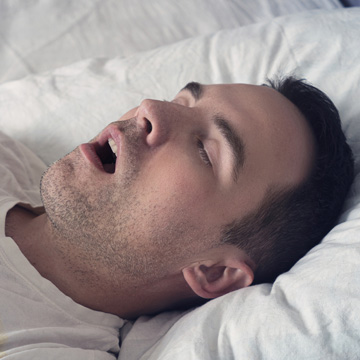Franklin, TN
Do you ever wake up with a sore throat or dry mouth? This isn’t entirely uncommon, nor does it always signal a health issue. But frequently waking with these symptoms could mean that you snore or are a mouth breather. Mouth breathing dries out the mouth, increases an abundance of harmful oral bacteria, and leads to bad breath, cavities, and gum disease. Therefore, our family dentist in Franklin at Lee Palmer, DDS, shares more information about how dry mouth and snoring could damage your health and ways to stop this problem.
Why is dry mouth a big deal?

Our saliva contains millions of bacteria. You may assume that all bacteria are germs and that they are damaging to your health. And while there are harmful bacteria in your mouth, there are good bacteria as well. Unfortunately, dry mouth or reduced saliva production increases harmful oral bacteria, while reducing the good guys. As a result, you’re more likely to develop cavities, and gum disease, which both result in bad breath.
What causes dry mouth?
It’s normal to experience dry mouth if you’re dehydrated or consumed salty food. Other causes may be smoking, medication side effects, or radiation therapy. But chronic dry mouth is another kind of problem. Nearly 40% of adults over the age of 65 experience dry mouth.
Here are some common causes of reduced saliva production.
- Xerostomia is a medical condition in which there is insufficient saliva production. Unfortunately, this condition results in an uncomfortable feeling in the mouth, and it affects one’s ability to chew and taste food properly. Additionally, xerostomia sufferers may find it difficult to carry on a conversation because their mouth remains so dry all of the time.
- Mouth breathing is a behavioral condition in which a person breathes through their mouth either during the day or while sleeping. Either way, mouth breathing dries out the mouth. If you find that you mouth breathe occasionally, like when you’re congested or sick, then it probably isn’t going to have as much of an impact compared to a chronic mouth breather. Additionally, chronic mouth breathing often signals another breathing problem known as sleep apnea.
What is sleep apnea?
Sleep apnea is an airway condition in which soft tissue of the airways restricts airflow to the lungs. This results in reduced oxygenation in the blood and strains the heart and brain. Additionally, sleep apnea sufferers may experience chronic fatigue, morning headaches, and signs of depression. The most common symptom of sleep apnea is snoring, although you could have this airway condition even if you don’t snore. Therefore, if you experience dry mouth or snore while sleeping, we recommend an airway screening by Dr. Palmer to determine if you could be at risk of having sleep apnea.
What treatments are available for mouth breathing?
To begin, Dr. Palmer assesses your airway and gathers information about your sleeping habits. He will also conduct a thorough oral examination. Then, he may recommend an official sleep study. If it is found that you have sleep apnea, that does not mean you will have to wear a CPAP machine. Dr. Palmer can prescribe a custom oral appliance that you wear while sleeping that helps open the airway and reduces snoring and mouth breathing. The oral appliance is comfortable and convenient, and many wearers have a higher compliance rate compared to CPAP users that typically discontinue their treatment after the first couple of months, putting them at risk again.
Sleep Apnea Screenings in Franklin Tennessee
Discovering that you have sleep apnea does not have to be scary and treatment nowadays is much more tolerable than in the past. If you snore or experience chronic dry mouth, ask Dr. Palmer about an airway screening today by calling (615) 794-0756.
